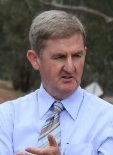Victorian state election, 2002
|
|
|||||||||||||||||||||||||||||||||||||||||||||
|---|---|---|---|---|---|---|---|---|---|---|---|---|---|---|---|---|---|---|---|---|---|---|---|---|---|---|---|---|---|---|---|---|---|---|---|---|---|---|---|---|---|---|---|---|---|
|
|||||||||||||||||||||||||||||||||||||||||||||
|
All 88 seats in the Victorian Legislative Assembly and 22 (of the 44) seats in the Victorian Legislative Council |
|||||||||||||||||||||||||||||||||||||||||||||
|
|||||||||||||||||||||||||||||||||||||||||||||
|
|||||||||||||||||||||||||||||||||||||||||||||
The 2002 Victorian state election, held on Saturday, 30 November 2002, was for the 55th Parliament of Victoria. It was held to elect the 88 members of Victorian Legislative Assembly and 22 members of the 44-member Legislative Council.
The Labor government led by Premier Steve Bracks was returned for a second term with a landslide, taking 62 seats. It was easily the biggest majority that Labor had ever won in Victoria, and one of Labor's best-ever performances at the state level in Australia. Additionally, it was only the third time that a Labor government had been reelected in Victoria. The Liberal opposition, led by Robert Doyle, was reduced to 17 seats — their worst result since the 1952 election. Labor also won a majority of seats in the Legislative Council for the first time in its history. The Nationals (who after breaking off their Coalition with the Liberals renamed themselves the 'VicNats') retained the seven seats they held from the 1999 election.
Labor was assisted by a strong economy and by the popularity of Steve Bracks, while the Liberal Party was badly divided between the Kroger and the Kennett factions. The Liberal campaign was also damaged by the revelation that the shadow treasurer, Robert Dean, was ineligible to run. Dean's electorate of Berwick had been abolished and merged into the new electorate of Gembrook. However, he failed to update his address after moving to his new electorate. As a result, he was no longer on the electoral roll; Victorian law requires candidates to be registered voters.
...
Wikipedia



